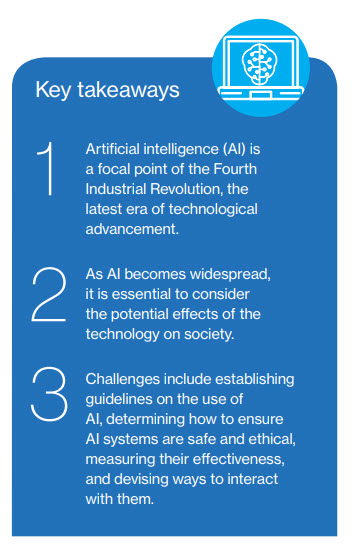Getting smart about the future of AI — from technologyreview.com by MIT Technology Review Insights
Artificial intelligence is a primary driver of possibilities and promise as the Fourth Industrial Revolution unfolds.
Excerpts:
The Industrial Revolution conjures up images of steam engines, textile mills, and iron workers. This was a defining period during the late 18th and early 19th centuries, as society shifted from primarily agrarian to factory-based work. A second phase of rapid industrialization occurred just before World War I, driven by growth in steel and oil production, and the emergence of electricity.
Fast-forward to the 1980s, when digital electronics started having a deep impact on society—the dawning Digital Revolution. Building on that era is what’s called the Fourth Industrial Revolution. Like its predecessors, it is centered on technological advancements—this time it’s artificial intelligence (AI), autonomous machines, and the internet of things—but now the focus is on how technology will affect society and humanity’s ability to communicate and remain connected.
That’s what AI technologies represent in the current period of technological change. It is now critical to carefully consider the future of AI, what it will look like, the effect it will have on human life, and what challenges and opportunities will arise as it evolves.
Also see:
- Where Next for AI In Business? An overview for C-level executives — from techrevolution.asia by Bernard Marr
Excerpt:
The AI revolution is now well underway. In finance, marketing, medicine and manufacturing, machines are learning to monitor and adapt to real-world inputs in order to operate more efficiently, without human intervention. In our everyday lives, AI kicks in whenever we search the internet, shop online or settle down on the sofa to watch Netflix or listen to Spotify. At this point, it’s safe to say that AI is no longer the preserve of science fiction, but has already changed our world in a huge number of different ways.So: what next? Well, the revolution is showing no signs of slowing down. Research indicates that businesses, encouraged by the initial results they have seen, are now planning on stepping up investment and deployment of AI.One of the most noticeable advances will be the ongoing “democratization” of AI. What this means, put simply, is that AI-enabled business tools will increasingly become available to all of us, no matter what jobs we do.
You’ll no longer need to be an expert in computer science to use AI to do your job efficiently – this is the “democratization” of AI and it’s a trend which will impact more and more businesses going forward.









